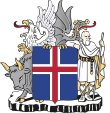| ||||||||||||||||||||||
| Results | ||||||||||||||||||||||
|---|---|---|---|---|---|---|---|---|---|---|---|---|---|---|---|---|---|---|---|---|---|---|
| ||||||||||||||||||||||
 |
|---|
A referendum on the prohibition of alcohol was held in Iceland on 21 October 1933. [1] Voters were asked whether to repeal the ban on importing alcohol imposed following a 1908 referendum being lifted. [2] Its repeal was approved by 58% of voters.